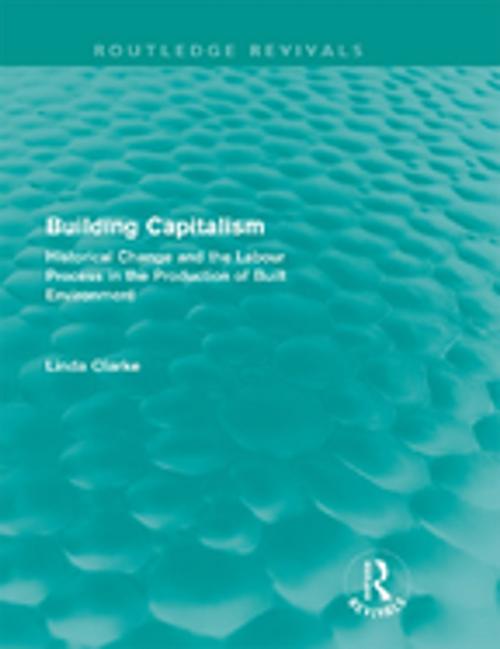Building Capitalism (Routledge Revivals)
Historical Change and the Labour Process in the Production of Built Environment
Business & Finance, Economics, Urban & Regional, Career Planning & Job Hunting, Labor, Economic History| Author: | Linda Clarke | ISBN: | 9781136599538 |
| Publisher: | Taylor and Francis | Publication: | December 6, 2012 |
| Imprint: | Routledge | Language: | English |
| Author: | Linda Clarke |
| ISBN: | 9781136599538 |
| Publisher: | Taylor and Francis |
| Publication: | December 6, 2012 |
| Imprint: | Routledge |
| Language: | English |
First published in 1992, this Routledge Revival sees the reissue of a truly original exploration of the nature of urbanization and capitalism.
Linda Clarke’s vital work argues that:
- Urbanization is a product of the social human labour engaged in building as well as a concentration of the labour force.
- The quality of the labour process determines the development of production.
- Changes to the built environment reflect changes in the production process and, in particular, the development of wage labour.
To support these arguments, the author identifies a qualitatively new historical stage of capitalist building production involving a significant expansion of wage labour, and hence capital, and the transition from artisan to industrial production.
Linda Clarke draws from a wide range of original material relating to the development of London from the mid-eighteenth to the early nineteenth century to provide a complete description of the development process: materials extraction, roadbuilding, housebuilding, paving, cleansing, etc; profiles of builders and contractors involved, and a picture of the new working class communities, as in Somers Town – their living conditions, population, working environment, and politics.
First published in 1992, this Routledge Revival sees the reissue of a truly original exploration of the nature of urbanization and capitalism.
Linda Clarke’s vital work argues that:
- Urbanization is a product of the social human labour engaged in building as well as a concentration of the labour force.
- The quality of the labour process determines the development of production.
- Changes to the built environment reflect changes in the production process and, in particular, the development of wage labour.
To support these arguments, the author identifies a qualitatively new historical stage of capitalist building production involving a significant expansion of wage labour, and hence capital, and the transition from artisan to industrial production.
Linda Clarke draws from a wide range of original material relating to the development of London from the mid-eighteenth to the early nineteenth century to provide a complete description of the development process: materials extraction, roadbuilding, housebuilding, paving, cleansing, etc; profiles of builders and contractors involved, and a picture of the new working class communities, as in Somers Town – their living conditions, population, working environment, and politics.















